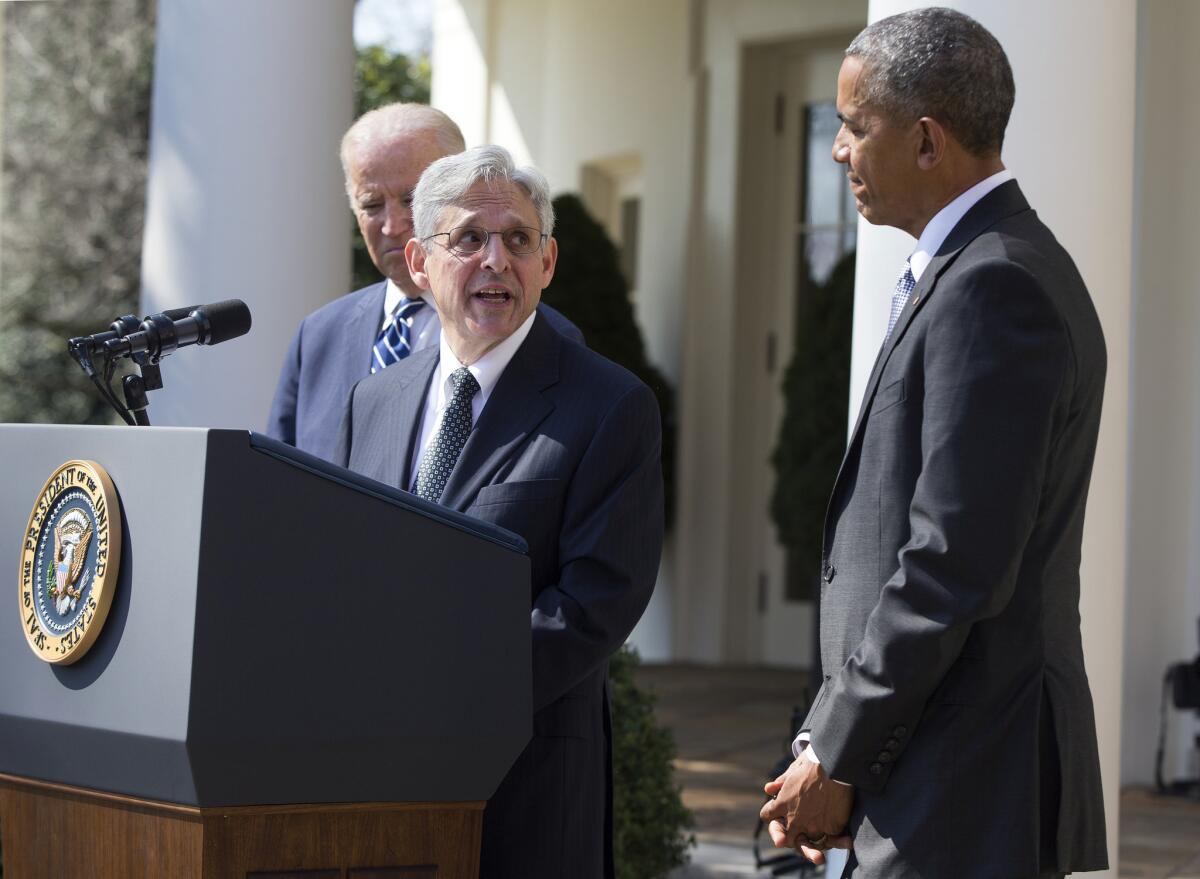Editorial: Senate Republicans’ refusal to consider Merrick Garland’s Supreme Court nomination is dangerous obstructionism

Merrick Garland speaks as President Obama and Vice President Joe Biden listen during the announcement of Merrick’s nomination to the Supreme Court at the White House on March 16.
- Share via
The stubborn refusal of Senate Republicans to consider any Supreme Court nominee offered by President Obama would be outrageous, regardless of whom the president selected to succeed Justice Antonin Scalia. But Obama’s announcement Wednesday that he will nominate Merrick Garland, a moderate federal appeals court judge who has won bipartisan praise during a long and distinguished legal career, puts the Republicans’ irresponsibility and cheap partisanship in even starker relief.
Garland, 63, is the chief judge of the U.S. Court of Appeals for the District of Columbia Circuit, on which he served with Chief Justice John G. Roberts Jr., who once said that “any time Judge Garland disagrees, you know you’re in a difficult area.”
Incredibly, Obama and Garland had barely finished a Rose Garden news conference before prominent Republicans reiterated that they would refuse to give Garland fair consideration. Senate Majority Leader Mitch McConnell (R-Ky.) dusted off the specious argument that because Obama is in his final year as president, his exercise of his appointment power must be held hostage to the results of the November election. “Give the people a voice in the filling of this vacancy,” McConnell pleaded.
Join the conversation on Facebook >>
This is a preposterous argument, and a cynical one to boot. The relevant vote of “the people” in this situation is their decision to support Barack Obama for president in 2008 and again in 2012. Perhaps sensing that his assertion was unconvincing, McConnell also cited a non-existent “Biden Rule,” which supposedly holds that the Senate shouldn’t vote on Supreme Court nominations in a presidential election year.
Finally, McConnell argued that refusing to take action in an election year — regardless of a nominee’s qualifications — was justified by language in the Constitution saying the president appoints members of the Supreme Court with the advice and consent of the Senate, meaning that the Senate could refuse consent. This is a tortured and transparently political interpretation of the advice and consent power. Carried to its logical conclusion, it would allow the Senate to exercise its “consent” by never acting on a nomination to the court.
It’s true that the Constitution vests appointment of Supreme Court justices jointly in the president and the Senate. It is also a fact that presidents often (and appropriately) take into account political factors in making a nomination, including the partisan composition of the Senate and even the election calendar.
Obama has done that in choosing a judge in his 60s over other, younger potential nominees who might have served longer on the court. It is also notable that in choosing Garland, Obama rejected suggestions that he nominate a candidate who, because of gender, ethnicity or a history of political activism, might electrify Democratic voters and enhance the election prospects of the Democratic nominee in November.
Instead, Obama has played it straight, explaining Wednesday that filling this vacancy “requires me to set aside short-term expediency and narrow politics.”
He added: “I have fulfilled my constitutional duty. Now it’s time for the Senate to do theirs. Presidents do not stop working in the final year of their term. Neither should a senator.”
The Garland nomination comes at a moment when cynicism and partisan politics in Washington are threatening Congress’ ability to do its work, to pass necessary laws, to reach compromise on the basis of shared values and to push the country forward. On Wednesday, President Obama warned, in the rational, non-histrionic manner that we may all be remembering fondly when President Trump controls the White House, that an abdication of the Senate’s duty to consider Garland will indicate that the judicial nomination process is “beyond repair.”
If Senate Republicans can’t be reasoned or shamed into abandoning their obstructionism, the damage won’t be confined to this nomination. “It will provoke an endless cycle of more tit-for-tat, and make it increasingly impossible for any president, Democrat or Republican, to carry out their constitutional function,” Obama said. “The reputation of the Supreme Court will inevitably suffer. Faith in our justice system will inevitably suffer. Our democracy will ultimately suffer, as well.”
Does the Republican Party, which is already experiencing a crisis of public confidence, really want to assume responsibility for that state of affairs?
Follow the Opinion section on Twitter @latimesopinion and Facebook
More to Read
A cure for the common opinion
Get thought-provoking perspectives with our weekly newsletter.
You may occasionally receive promotional content from the Los Angeles Times.










